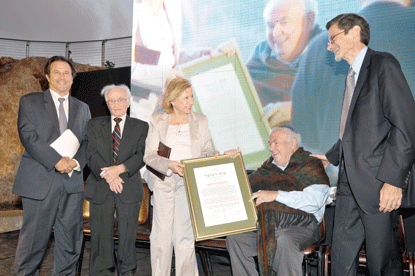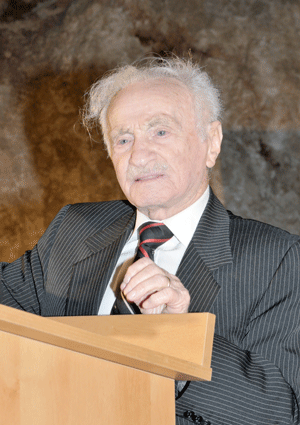Two educators were chosen as recipients of the 15th annual Liebhaber Prize for the Promotion of Religious Tolerance in Israel
By TEDDY WEINBERGER / Special to the AJW
On May 29, the Schechter Institute of Jewish Studies hosted the 15th annual award ceremony of the Rabbi Marc and Dr. Henia Liebhaber (z”l) Prize for the Promotion of Religious Tolerance in Israel. The ceremony was held in the courtyard of Schechter’s new Beit Legacy Heritage Classroom Building. The 2012 Liebhaber Prize recipients are Rabbi Professor David Hartman and Professor Na’ama Sabar Ben-Yehoshua.
Rabbi Hartman, who made aliya from Montreal in 1971, founded the Shalom Hartman Institute, a research center and think tank for Jewish and Zionist education. Over the past 26 years the Hartman Institute has educated tens of thousands of people both from Israel and the Diaspora: high school students, teachers and community leaders from all streams of Judaism. Rabbi Hartman has authored many crucial books in Jewish thought, including the most important book in contemporary Jewish theology: A Living Covenant: The Innovative Spirit in Traditional Judaism (1986). His 1999 publication, A Heart of Many Rooms: Celebrating the Many Voices Within Judaism, bears witness to his dedicated commitment to religious pluralism and tolerance.
Professor Na’ama Sabar Ben-Yehoshua is considered one of the foremost scholars in the realm of educational research and Jewish education. On a parallel track, she devotes much time and effort to promoting Jewish and pluralistic education among all sectors of Israeli society. She is professor emerita for Jewish education at Tel Aviv University and currently heads the Jewish Culture Program at the Achva College for Education, which emphasizes the importance of a tolerant, open and critical world-view as well as the need to acquire knowledge in Jewish sources.

Colette Avital (third from left), former Israeli ambassador and Knesset member and current chair of the Schechter Institute executive committee, presented the Liebhaber Prize to Rabbi David Hartman (second from right). Looking on are Rabbi David Steinhardt (left), of B’nai Torah Congregation, Boca Raton, Fla.; Rabbi Marc Liebhaber; and Professor David Golinkin (right), president of the Schechter Institute. Professor Na’ama Sabar Ben-Yehoshua also was a 2012 Liebhaber Prize recipient. (Photos: Courtesy of Schechter Institute of Jewish Studies)
The Liebhaber Prize was awarded as part of the Schechter Institute’s graduation ceremony. The institute boasts the largest M.A. program in Jewish studies in the State of Israel. However, in Schechter Institute President David Golinkin’s address, there were several indications that (as Rabbi Liebhaber himself was to later remind the audience during his own remarks) “we have not yet reached our destination” concerning religious tolerance in Israel.
Golinkin reminded the audience that “the State of Israel forces Jews to marry through the [Orthodox] Rabbinate,” and he noted that “for 64 years the State of Israel has controlled the batei midrash [houses of Judaic study].” Golinkin went on to tell the 76 new graduates that they “have the power to change this situation,” and he urged them to teach Judaism to all comers “in an open, attractive, and even academic manner.”
Rabbi Liebhaber’s remarks were particularly well received (after the ceremony many of the young people in the audience went up to congratulate him), and he reiterated his message of tolerance to me in a long meeting that I was privileged to have with him on the day after the ceremony.

Rabbi Marc Liebhaber delivered remarks that were well received, especially by the young audience members.
“Judaism’s strength is that it changes,” said Rabbi Liebhaber, a former pulpit rabbi in Minneapolis, and the former senior editor and pubisher of the American Jewish World. “But you can’t fashion society according to your will by force. You can do it only by debate, convincing, and then let nature take care of it.”
He added, “We have always had different schools of thought, such as the House of Hillel and the House of Shammai, and we have always had different streams of Judaism.”
When I told him, “Yes, but they always hated each other,” he replied: “If they didn’t hate each other I wouldn’t have to give a prize.”
And I learned from Rabbi Liebhaber that tolerance is an excellent life attitude (no small recommendation coming from a 94-year-old). When I asked him how I personally can become more tolerant, especially when I am regularly faced with my five college-aged children who steadfastly refuse to live their lives according to my exclusive dictates, he had two words for me: “Let them.” And then he said this: “If you’re not tolerant it’s no tragedy either; you just made your life a little bit more difficult.”
As it turned out, May 29 was not just a day of celebration of religious pluralism and tolerance for the Schechter Institute but for the entire State of Israel. On that day Israeli Attorney General Yehuda Weinstein announced that the the government will begin funding the salaries of some non-Orthodox rabbis to non-Orthodox communities (see story on Page 1). Though these non-Orthodox rabbis will still not have state authority over religious matters, for the first time in Israel’s history the state has agreed to pay and to refer to Reform and Conservative rabbis as “rabbis.”
According to President Golinkin, “This is a giant step forward towards religious pluralism in Israel.”
(American Jewish World, 6.8.12)



















